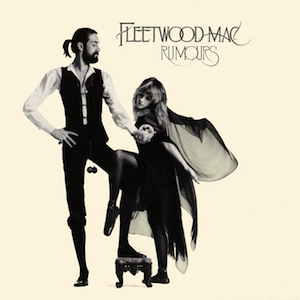Popular music has a broad canvas, and this is certainly true of 1977. Amid what some saw as the dying embers of Prog (how wrong that was!) and the anarchic energy of punk (flash in the pan?), there was room for the soft rock stylings of Fleetwood Mac. Beginning their musical journey some 9 years earlier, as, at times, a very good blues outfit, the band had changed course musically and by 1975's eponymous album had begun to carve out a niche for themselves in a softer, poppier rock music. Thought not a huge hit in the UK (it peaked at 23), this eponymous 'White' album was their first US number 1, and paved the way for the phenomenal global success that was shortly to come their way.
From a songwriting perspective, Rumours is essentially the work of Lindsey Buckingham & Stevie Nicks, who contribute 3 songs each, and Christine McVie, who has 4 songs (3 of which she takes solo lead vocal duties for), with the whole band being credited for writing 'The Chain'. This was an almost ubiquitous album during 1977, which spawned 4 hit singles, guaranteeing it constant air-play on radio and TV. It managed to hit the balance between pop and rock almost perfectly, being equally at home with Tony Blackburn and DLT as it was with Annie Nightingale and Alan Freeman.
The songs range in tempo throughout the album. 'Second Hand News' is a good, upbeat opener, whereas 'Dreams' the best-selling song from the collection, is more obviously ponderous (though not in a bad way). The next three tunes - 'Never Going Back Again', 'Don't Stop' and 'Go Your Own Way' - pick up the beat again, the latter really beginning to rock, before side one closes with the sublime 'Songbird', which starts as a solo piano song, with acoustic guitar gradually rising in the mix, all the time playing support to Christine McVie's voice.
Side two opens with 'The Chain', with its metronomic drum pattern which develops into some quite expressive and inventive percussion, and from John McVie perhaps one of the most recognised bass riffs in rock towards the end - the theme of Formula One. A couple more up-beat tunes follow: 'You Make Loving Fun' has an almost disco tempo to it, and 'I Don't Want To Know', a joyous little romp of a song, really! 'Oh Daddy' is another ballad from Christine McVie, with a kind of celtic feel to it in places, but it doesn't have the same depth to it as the earlier slow songs for me. 'Gold Dust Woman' closes the album, a steady soft rock song with acoustic slide guitar and more metronomic drums. Although the longest song on the album, at just under 5 minutes, it doesn't seem over-long compared to the other songs.
This is a timeless collection of great songs, that has stood the test of time and still features in the album charts as I write this, 40 years after its release! There is hardly a duff track on this album: maybe not all killers, but not far short, and all capable of resonating with today's music lovers in the same way it did on release.
1977 is still proving to be a great year for music! And there's more to come!

No comments:
Post a Comment